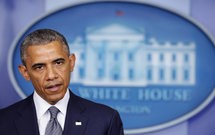 U.S. President Barack Obama gave a news conference July 18 on the Malaysian airliner that was shot down in eastern Ukraine. In the conference, Obama stopped short of blaming any specific groups or individuals, though he did say that it was clear the airliner was taken down by a surface-to-air missile, and that the missile was fired from territory controlled by Russian-backed separatists.
U.S. President Barack Obama gave a news conference July 18 on the Malaysian airliner that was shot down in eastern Ukraine. In the conference, Obama stopped short of blaming any specific groups or individuals, though he did say that it was clear the airliner was taken down by a surface-to-air missile, and that the missile was fired from territory controlled by Russian-backed separatists.
Obama also said that a lot of misinformation has surrounded the incident and the conflict in eastern Ukraine in general, and that an investigation will take place with additional information likely to come out over the "next 24-48 hours, next week or next month."
Although the United States is not yet directly implicating Russia in the incident, Obama did accuse Moscow of giving the separatists support, including "arms, training, heavy weapons and anti-aircraft weapons." He also mentioned the separatists' previous successes in shooting down Ukrainian fighter jets, which he said would not have been possible without heavy weaponry. Obama added that Russia "has the ability to move the separatists in a different direction," and that a cease-fire must be established so an independent investigation into the shooting can be made.
Though concrete information on who exactly was responsible remains unclear, the dynamics of the three-monthlong conflict between Ukraine and the pro-Russian separatists in the east is likely to change as a result of the airline shooting. The current evidence of the shooting, while still incomplete and without independent verification, points to pro-Russian separatists as the most likely perpetrators (although it remains unclear whether they did this with either a captured Ukrainian air defense system or with one delivered by Russia). This evidence, based on intercepted audio recordings and video footage provided by the Ukrainian security services, is likely being checked and corroborated by U.S. and other Western intelligence agencies, and examined alongside their own intelligence on the incident as well.
If the pro-Russian separatists are indeed the culprits, Russia has two options. Moscow can remain obstinate to the West and therefore risk incurring much harsher sanctions from both the United States and Europe. Alternately, it can reduce its unofficial support for the rebels by limiting or eventually stopping the flow of arms and trained personnel across the border, as well as ordering Russian-backed groups to dial down their activities in the region. The former option would significantly hurt the Russian economy; up to now, sanctions have caused only limited economic pain. The latter option would very likely facilitate the Ukrainian military's security operations against the separatists and could lead to the defeat of most rebel elements within weeks or months.
Both options will place tremendous pressure on Russian President Vladimir Putin, both from abroad and at home. The Europeans have thus far spared Russia from meaningful sanctions, but this could change if Russian-backed separatists are found responsible. This would significantly affect Russia's trade and political ties with Europe, and this in turn could weaken Putin's domestic popularity, which has been at a high point throughout the crisis. Public perception of Russia as a weak actor on the world stage could hurt Putin's domestic standing, and it could also force him to assign blame within the Russian security services, particularly the Main Intelligence Directorate. Although it could take days or even weeks to get clear answers about the airliner incident, pressure on Russia is rising.
Courtesy : Stratfor (www.stratfor.com)